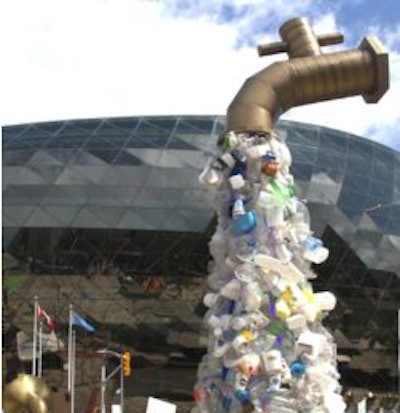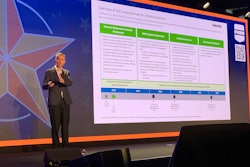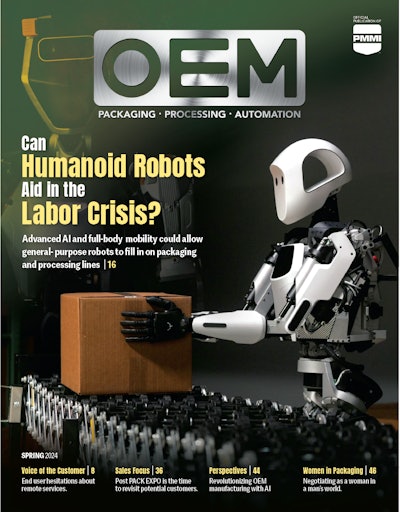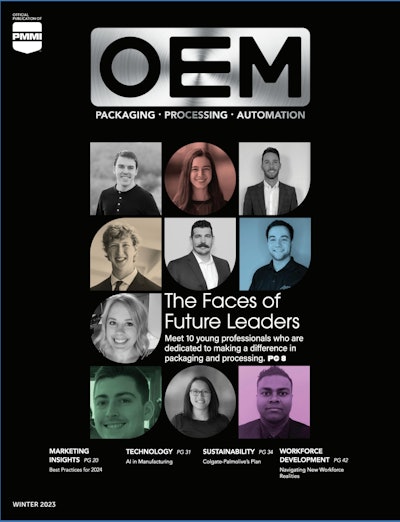
While progress was made at the Intergovernmental Negotiating Committee (INC-4) for a Global Plastics Treaty during the latest round of negotiations in Canada that wrapped up on April 30, disagreements remain about whether to put global limits on plastic production.
For the first time in the process, negotiators discussed the text of what is supposed to become a global treaty. Delegates and observers at the INC-4 called it a welcome sign that talks shifted from ideas to treaty language at this fourth of five scheduled meetings.
“The pressure was on at INC-4 for countries to make up for lost time,” said Erin Simon, WWF-US vice president and head of plastic waste and business. “With the world watching, negotiators made incremental progress by including some of the key ingredients needed for a successful treaty.”
The Ellen MacArthur Foundation felt there was an opportunity for more than incremental progress, highlighting the divide between Member States supporting binding global rules and those preferring nationally determined measures in many areas. In addition, the EMF cited the lack of agreement regarding taking action on plastic production and the reduction of primary plastic polymers as opposed to focusing mainly on plastic recycling and better waste management.
“Together with the Business Coalition for a Global Plastics Treaty (convened by the Ellen MacArthur Foundation and WWF), we want to see measures addressing the full lifecycle in order to eliminate the plastics we don’t need, innovate towards new materials and business models, and circulate any plastic we still need to ensure that we realize the vision of a world in which plastic never becomes waste or pollution,” said Rob Opsomer, executive lead of Plastics and Finance at the Ellen MacArthur Foundation.
The most contentious idea is limiting the amount of plastic manufactured. This remains in the text despite the strong objections of plastic-producing countries and companies as well as oil and gas exporters. Most plastic is made from fossil fuels and chemicals.
Matt Seaholm, president and CEO of the Plastics Industry Association (PLASTICS), believes the negotiations are at a critical point, and that is why the plastic industry continues to support the effort to end plastic pollution worldwide. He added, however, that stopping the production of plastic should not be the focal point as has been the case.
As the Ottawa session ended, the committee agreed to continue working on the treaty before its final meeting in South Korea later this year.
Simon indicated that the final meeting will be critical, and the clock is ticking. “More work must be done between now and the final round of negotiations if we’re going to deliver an effective and legally binding treaty that people and the planet deserve,” she said.
The preparations for that session will focus on financing the implementation of the treaty, assessing the chemicals of concern in plastic products, and examining product design. Rwanda’s representative said negotiators ignored the elephant in the room by not addressing plastic production.
“In the end, this is not just about the text, it’s not just about the process,” said Jyoti Mathur-Filipp, executive secretary of the committee to the Associated Press. “It is quite simply about providing a better future for generations and for our loved ones.”
Stewart Harris, an industry spokesperson with the International Council of Chemical Associations (ICCA), said the members want a treaty that focuses on recycling plastic and reuse, or circularity.
They don’t want a cap on plastic production and are opposed to chemical regulation being part of the agreement. Harris said ICCA was pleased to see governments coming together and agreeing to complete additional work, especially on financing and plastic product design.
According to the AP, dozens of scientists from the Scientists’ Coalition for an Effective Plastics Treaty attended to provide research on plastic pollution to negotiators and to dispel misinformation.
“I heard yesterday that there’s no data on microplastics, which is verifiably false: 21,000 publications on micro and nanoplastics have been published,” Bethanie Carney Almroth, an ecotoxicology professor at Sweden’s University of Gothenburg who co-leads the coalition told the AP.
She cited scientist harassment and intimidation by lobbyists and reported to the U.N. that a lobbyist yelled in her face at a meeting.
Despite their differences, Ecuador's chief negotiator, Walter Schuldt, said that the countries present at INC-4 share a common vision to move forward in the treaty process.
“At the end of the day, we’re talking about the survival of the future of life, not only of human life but all sorts of life on this planet,” he said in an interview.
The treaty talks began in Uruguay in December 2022 after Rwanda and Peru proposed the resolution that launched the process in March 2022. Progress was slow during Paris talks in May 2023 and in Nairobi in November 2023 as countries debated rules for the process.
As thousands of negotiators and observers descended on Ottawa, Luis Vayas Valdivieso, the committee chair from Ecuador, reminded attendees of their goal to deliver a plastic pollution-free future. He asked them to be ambitious.
The delegates have been discussing not only the scope of the treaty but chemicals of concern, problematic and avoidable plastics, product design, and financing and implementation.
Delegates also streamlined the unwieldy collection of options that emerged from the last meeting.
“We took a major step forward after two years of lots of discussion. Now we have text to negotiate,” said Björn Beeler, international coordinator for the International Pollutants Elimination Network. “Unfortunately, much more political will is needed to address the out-of-control escalating plastic production.”
Greenpeace viewed the negotiations as disappointing, claiming the committee caved into the interests of the fossil fuel and petrochemical industry.
“We saw some progress, aided by the continued efforts of states such as Rwanda, Peru, and the signatories of the Bridge to Busan declaration in pushing to reduce plastic production,” said Graham Forbes, Greenpeace Head of Delegation to the Global Plastics Treaty negotiations and Global Plastics Campaign Lead at Greenpeace US. “However, compromises were made on the outcome, which disregarded plastic production cuts, further distancing us from reaching a treaty that science requires and justice demands. People are being harmed by plastic production every day, but states are listening more closely to petrochemical lobbyists than health scientists.”
She added, “We are heading towards disaster and with time running out - we need a Global Plastics Treaty that cuts plastic production and ends single-use plastic. There is no time to waste on approaches that will not solve the problem.”


















